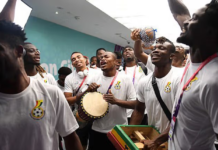Lance Corporal Amedeka, the army officer tried in abstentia and found guilty in the cold abduction and murder of three high court judges and an army officer is cooling off in a North American country, Malik Kweku Baako Jnr has revealed.
He, like Amartey Kwei and others were to be shot at the Teshie range for the murder that shook the country and the foundation of the judiciary in 1982 but Amedeka broke jail, fled the country 36-years ago.
According to Kweku Baako, the unimpeachable information he has picked up suggests the former army officer is alive and well.
“I got a hint where Amedeka is,” he said. “He is somewhere in a North American country,” he added.
ALSO: How a policeman’s drunkenness led to biggest tip-off in who killed the judges
He had already expressed misgivings about the failure by subsequent governments to track him down with the help of Interpol and serve him the justice he deserved.
Baako made the comments on Joy FM’s Newsfile programme Saturday while discussing Rawlings’ reaction to the “Who killed the judges” documentary produced by Multimedia’s Raymond Acquah.
Mr Rawlings was appalled by what he termed as a desperate attempt to blame innocent people for a crime which has long been dealt with and perpetrators punished for same.
He did not understand why Multimedia will seek to do a documentary about the killing of judges 36 years ago when it equally could have investigated the killing of the overlord of Dagbon Ya-Na Yakubu Andani and his elders.
MORE: WHO KILLED THE JUDGES: Baako reveals missing links of damning history
“We have rehashed and recooked history to make innocent people look murderous. And in the next breath using the same name to endorse yourselves because Rawlings said he is cultured (compared to his predecessors). This is vicious and callous political opportunism,” he said.
But Kweku Baako Jnr said Mr Rawlings should have exercised the option of silence in this particular matter.
Quoting page 139 of the Executive summary of a report released by the National Reconciliation Commission on 12 October 2004, Mr Baako read a portion of the SIB report which had named Captain Kojo Tsikata as a co-conspirator in the killing of the judges.
The report further stated that Tsikata, a former National Security advisor could not have carried out the heinous act without clearance from a higher authority, who was then the military head of state, Fl Lt Jerry John Rawlings.
ALSO: WHO KILLED THE JUDGES: Bodies burnt because Justice Cecilia refused to die – Baako reveals
According to Baako several efforts by the NRC to get Mr Rawlings to respond to allegations about his alleged complicity in the murder of the judges, he declined or refused to appear before it.
Even when he was subpoenaed to appear before the Commission with two videos, he failed to provide same with the explanation that the videos were in the custody of a man who had died.
If Mr Rawlings failed to cooperate with the NRC and has remained silent 14 years in the face of the damning conclusions contained in the findings of the NRC report, Kweku Baako Jnr found it intriguing that the same man has found it worthwhile to comment on a documentary produced by Joy News.
“Rawlings didn’t have the requisite capacity to appear before the Commission, but if it was a chop bar or rally, he is ready to do cowboyism” he said.
Member of Parliament for South Dayi Rockson Dafeamekpor said the timing of the release of the documentary was intriguing.
He wished the documentary would have brought up new facts but it didn’t.
MORE: Rawlings launches attack on ‘Who Killed the Judges?’ documentary
On June 30, 1982, three High Court judges, Mrs. Justice Cecelia Koranteng Addo, Kwadwo Adjei Agyepong, Poku Sarkodie and an army officer, Major Sam Acquah were abducted within curfew hours, shot and burnt by ruthless, lawless men including young soldiers over claims they were corrupt.
The judges had adjudicated high profile cases involving the then military government and had freed suspects who were brought before them. They were abducted and murdered ostensibly because they were deemed to be bias and corrupt.
The murder shook the nation prompting the arrest of some of the suspects who were tried and found guilty. Joachim Amartey Kwei,L/Cpl Samuel Michael Senyah, ex-soldier Johnny Dzandu,Tony Tekpor, L/Cpl Gordon Kwowu, L/Cpl Mama Nsurowua, L/Cpl Victor Gomeleshio, Sgt. Daniel Alolga Akata Pore were all named.


![Ghana discover WAFU Zone B U17 Championship group [Full Group]](https://www.adomonline.com/wp-content/uploads/2024/04/WhatsApp-Image-2023-04-14-at-10.39.33-AM-218x150.jpeg)




